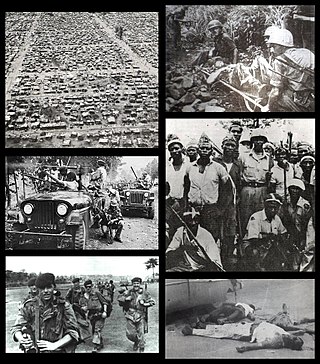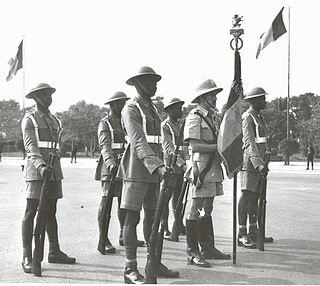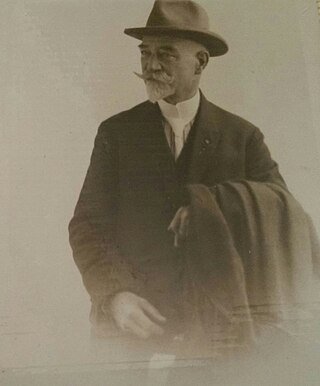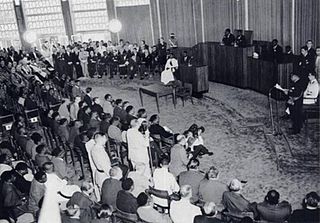
Congopresse was a photographic agency active in the Belgian Congo and in the early years of the Republic of the Congo.

Congopresse was a photographic agency active in the Belgian Congo and in the early years of the Republic of the Congo.
Congopresse was founded in 1947, [1] under the aegis of the Belgian colonial administration's Centre d'information et de documentation du Congo belge et du Ruanda-Urundi. [2] The agency served was the main source of documentary photography and photojournalism from Congo in the 1950s, as foreign press rarely traveled to the Congo or took their own photographs there. The photos were sent to Brussels where the Ministry of Colonies compiled, edited, and disseminated them as propaganda. [1]
Congopresse largely relied on European photographers in its early years. [3] [4] Joseph Makula was hired as its first Congolese photographer in 1956. [5] The European staff all left at independence, and in the 1960s Makula trained a new generation of Congolese photographers to replace them, [3] [4] including Mpate Sulia, the agency's only female photographer. [5] The agency closed in 1968. [6] The Royal Museum for Central Africa in Belgium currently maintains the Congopresse archives. [7]

The Belgian Congo was a Belgian colony in Central Africa from 1908 until independence in 1960 and became the Republic of the Congo (Léopoldville). The former colony adopted its present name, the Democratic Republic of the Congo (DRC), in 1964.

The Congo Crisis was a period of political upheaval and conflict between 1960 and 1965 in the Republic of the Congo. The crisis began almost immediately after the Congo became independent from Belgium and ended, unofficially, with the entire country under the rule of Joseph-Désiré Mobutu. Constituting a series of civil wars, the Congo Crisis was also a proxy conflict in the Cold War, in which the Soviet Union and the United States supported opposing factions. Around 100,000 people are believed to have been killed during the crisis.

The Royal Museum for Central Africa (RMCA), communicating under the name AfricaMuseum since 2018, is an ethnography and natural history museum situated in Tervuren in Flemish Brabant, Belgium, just outside Brussels. It was originally built to showcase King Leopold II's Congo Free State in the International Exposition of 1897.

South Kasai was an unrecognised secessionist state within the Republic of the Congo which was semi-independent between 1960 and 1962. Initially proposed as only a province, South Kasai sought full autonomy in similar circumstances to the much larger neighbouring state of Katanga, to its south, during the political turmoil arising from the independence of the Belgian Congo known as the Congo Crisis. Unlike Katanga, however, South Kasai did not explicitly declare full independence from the Republic of the Congo or reject Congolese sovereignty.

The Force Publique was a gendarmerie and military force in what is now the Democratic Republic of the Congo from 1877, through the period of Belgian colonial rule. The FP was retitled as the Congolese National Army or ANC in July 1960 after independence.

Évolué is a French label used during the colonial era to refer to an African who had "evolved" by becoming Europeanised through education or assimilation and had accepted European values and patterns of behavior. It is most commonly used to refer to individuals within the Belgian and French colonial empires. Évolués spoke French, followed European laws, usually held white-collar jobs, and lived primarily in urban areas of the colony.

The University of Kinshasa, commonly known as UNIKIN, is one of the three major universities in the Democratic Republic of the Congo, together with the University of Kisangani and University of Lubumbashi. Originally founded in 1954 as Lovanium University during Belgian colonial rule, the current university was established following the division of the National University of Zaire (UNAZA) in 1981. The university is located in Kinshasa's Lemba commune.

General elections were held in the Belgian Congo on 22 May 1960, in order to create a government to rule the country following independence as the Republic of the Congo (Congo-Léopoldville), scheduled for 30 June. The 137-seat Chamber of Deputies was elected by men over the age of 21. The seats were filled by district-based lists, although only two parties, the Mouvement National Congolais-Lumumba (MNC-L) and the Parti National du Progrès, submitted lists in more than one district.

The Republic of the Congo was a sovereign state in Central Africa, created with the independence of the Belgian Congo in 1960. From 1960 to 1966, the country was also known as Congo-Léopoldville to distinguish it from its northwestern neighbor, which is also called the Republic of the Congo, alternatively known as "Congo-Brazzaville". In 1964, the state's official name was changed to the Democratic Republic of the Congo, but the two countries continued to be distinguished by their capitals; with the renaming of Léopoldville as Kinshasa in 1966, it became also known as Congo-Kinshasa. After Joseph Désiré Mobutu, commander-in-chief of the national army, seized control of the government in 1965, the Democratic Republic of the Congo became the Republic of Zaire in 1971. It would again become the Democratic Republic of the Congo in 1997. The period between 1960 and 1964 is referred to as the First Congolese Republic.

Herzekiah Andrew Shanu was a photographer recognized for his involvement in the campaign against abuses in the Congo Free State.
Joseph Makula (1929–2006) was a Congolese photographer. He initially served as a military photographer for the Force Publique before being hired as the first Congolese photographer for Congopresse in 1956. After Congopresse closed in 1968, he worked as a freelancer and established his own studio. He died in 2006.

Casimir Ostoja Zagourski was a Polish pioneering photographer of Central African peoples and customs.

Carl Friedrich Wilhelm Robert Visser was a merchant, photographer and collector of ethnographica.

The Speech at the Ceremony of the Proclamation of the Congo's Independence was a short political speech given by Patrice Lumumba on 30 June 1960 at the ceremonies marking the independence of the Republic of Congo from Belgium. It is best known for its outspoken criticism of colonialism.

The involvement of the Belgian Congo in World War II began with the German invasion of Belgium in May 1940. Despite Belgium's surrender, the Congo remained in the conflict on the Allied side, administered by the Belgian government in exile.

The Léopoldville riots were an outbreak of civil disorder in Léopoldville in the Belgian Congo which took place in January 1959 and which were an important moment for the Congolese independence movement. The rioting occurred when members of the Alliance des Bakongo (ABAKO) political party were not allowed to assemble for a protest and colonial authorities reacted harshly. The exact death toll is not known, but at least 49 people were killed and total casualties may have been as high as 500. Following these riots, a round table conference was organized in Brussels to negotiate the terms of Congo's independence, The Congo received its independence on 30 June 1960, becoming the Republic of the Congo.

The Palais de la Nation is the official residence and principal workplace of the President of the Democratic Republic of the Congo. It is strategically situated in Gombe, north of Kinshasa, adjacent to the course of the Congo River, and has held its role since 2001, following the assassination of Laurent-Désiré Kabila.
Kiripi Katembo, also known as Kiripi Katembo Siku, was a Congolese photographer, documentary filmmaker and painter. Katembo's short films, photography and other projects focused on the daily lives of the people of Kinshasa, as well as the economic and social challenges facing the Democratic Republic of the Congo. He was also a founding director of Mutotu Productions, his film production company, and the executive director of Yango Biennale, based in Kinshasa.

Jean Bolikango, later Bolikango Akpolokaka Gbukulu Nzete Nzube, was a Congolese educator, writer, and conservative politician. He served twice as Deputy Prime Minister of the Republic of the Congo, in September 1960 and from February to August 1962. Enjoying substantial popularity among the Bangala people, he headed the Parti de l'Unité Nationale and worked as a key opposition member in Parliament in the early 1960s.

Congolese nationality law is the nationality law for the Democratic Republic of the Congo. It is regulated by the Constitution of the Democratic Republic of the Congo, as amended; the Congolese Nationality Code, and its revisions; the Congolese Civil Code; and various international agreements to which the country is a signatory. These laws determine who is, or is eligible to be, a national of the Democratic Republic of the Congo.